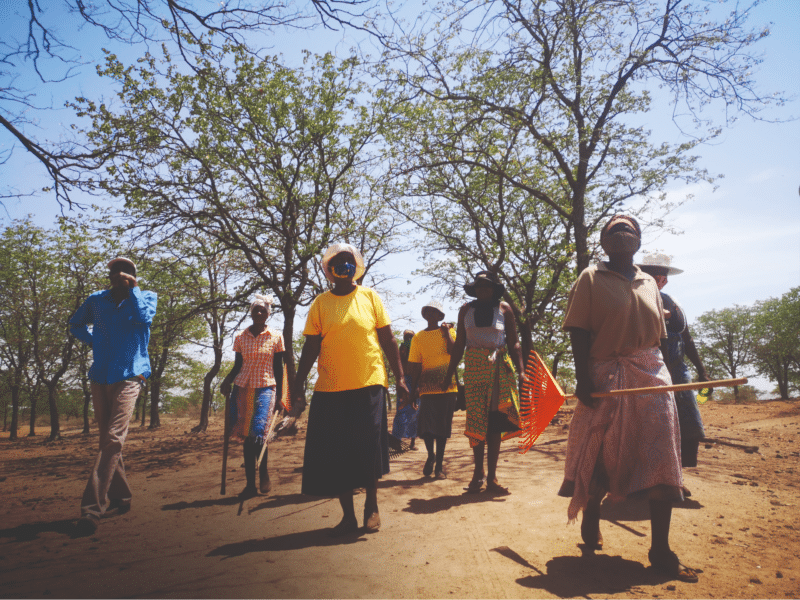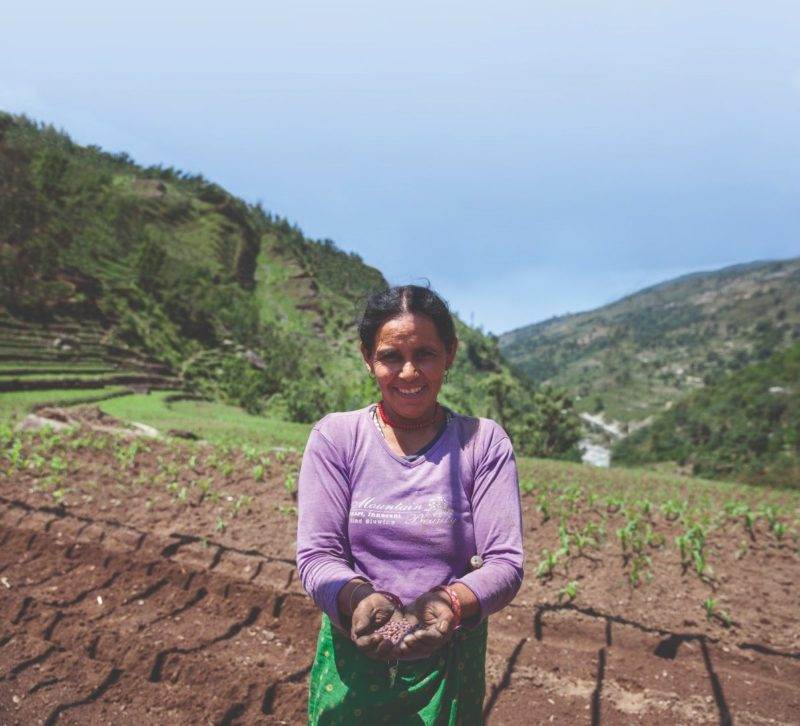Prabin Gurung, from our team in Kathmandu, introduces you to the determined mountain communities of rural Nepal for this year’s UK Aid Match appeal.
The people of remote, mountainous Nepal live in one of the harshest environments on Earth.
From generation to generation they have survived by passing their farming skills and their deep understanding of the land and the weather to their children.
Survival has always been tough here, growing just enough food to eat, heaving heavy loads up and down treacherous mountain tracks.
But today, climate change is making life even harder. In the monsoon season, torrential rain and floods destroy crops and cause landslides.
Rising temperatures mean new crop pests and diseases that blight harvests. And the dry season is drier than ever before, so water for drinking and watering crops runs short. The added impact of the pandemic threatens to tip vulnerable families over the edge.
Since my first visit to these communities in 2013, I’ve seen for myself how hard life is here. But I’ve also seen what’s possible when a community gets the opportunity and knowhow to change things.
Let me show you the transformation we’re hoping to help bring to the districts of Rukum, Rolpa and Dang.
Double your donation!
Donate today and your incredible support will unlock twice the opportunity.
Every pound you donate will be matched by the UK government.
Together we can help Radhika overcome a mountain of obstacles
In the district of Dang, I spoke with farmer Radhika Pariya. She is no stranger to hardship. Her parents passed away when she was small, and she grew up with her brothers in poverty. Like most people in the mountains of rural Nepal, Radhika is a subsistence farmer. She faces enormous challenges just to survive. She told me:
“There are a lot of problems. We don’t get seeds and fertilisers on time. There’s no proper irrigation facility. There’s no fixed marketplace to sell the produce.”
And climate change is making matters much worse:
“It was raining till yesterday so we couldn’t plant mustard, but the time for planting mustard is almost over. Likewise, sometimes when we need rain, it doesn’t rain. Currently our corn plants are attacked by insects too. It’s not the first time. Last year and the year before, our cornfields were attacked and it all went to waste.”
Radhika has always fought for a better life for people like herself. She has used her singing and dancing skills to raise awareness of social justice issues. And recently, she ran as a candidate in local elections. She is passionate about creating change for women farmers like herself.
I asked Radhika why the majority of the farmers I’d seen at work in her community were women. She told me, “Even after giving one hundred percent while farming, the produce we get from our field is enough to last only for a maximum of six months. To make a living for the remaining six months, men from our community go to India or other countries to earn.”
While the men are away working as daily wage labourers, the women are left with a punishing workload. Their day begins at 4am, with long walks on steep mountain paths to fetch water and firewood for cooking. Then they must attend to the needs of their children and older relatives before going to their fields to farm.
The extreme challenges that Radhika faces every day are common to most people in this region. But big change is possible.
“We have so many natural resources in our country. If we give our best and work hard, then we can live a good life.”
Tek Bahadur Thapa, Farmer in Bajura district
Welcome to a brighter future.
In areas of rural Nepal where Practical Action has already worked, you can see the difference in the people’s faces. It’s in their smiles. You can feel the positive energy and sense of opportunity.
Tek’s farm is flourishing
When Practical Action came to Bajura district in 2017, Tek Bahadur Thapa was one of thousands of farmers keen to learn about climate-smart agriculture and business skills. The new multi-use water system that we built with the community meant Tek could always irrigate his crops.
Equipped with better business and farming skills, he began selling his produce at the nearby Bamka Bazaar. In recognition of his efforts, Tek received a special farming award from the President of Nepal.
We recently followed up with Tek to see how he was doing. Thanks to his dedication, Tek has been able to realise his big ambitions. He’s been so successful that he has bought a bigger farm, where he now runs a banana business.
The farmer who took over Tek’s previous farm is continuing to grow more vegetables, so the benefit of this work continues to spread.
Suchana’s load has been lightened
I’ve seen for myself how steep and perilous the mountain paths of rural Nepal are. Accidents are common, sometimes even ending in tragedy. In the village of Mana, I met Suchana Mijar. Several years ago, she’d had a dreadful accident on the paths while pregnant. She’d been carrying a heavy basket of grass, when she slipped and fell about 25 metres. She broke her shoulder and cut her face. “I felt lucky to survive,” she told me. “But my baby is even luckier.”
But now, cable cars powered by gravity have changed everything in Mana. This cable system uses gravity to move heavy goods downhill, while propelling another load uphill. It’s a simple but ingenious engineering solution that needs no additional source of power. For Suchana, the ropeway is a life-saver.
“I was very happy when I saw the ropeway working. My daughter will not have to carry heavy loads like her mother and grandmother. I believe she will have a healthier future.”
Suchana Mijar, farmer in Mana village
I could tell you about many other people whose lives I’ve seen transformed with training and ingenuity.
Ganesh Bahadur Thapa has become the hub of his community, selling seeds and farming equipment.
Kaldhari Devi Saud has become so skilled at farming commercially that her neighbours come to her for advice.
And Ram Maya Rokaya found the strength to leave an abusive relationship and build a successful farming business by herself, with enough money to send her children to school.
There are still many more communities who need the chance to make this transformation for themselves. And today you have an opportunity to be part of that transformation.

